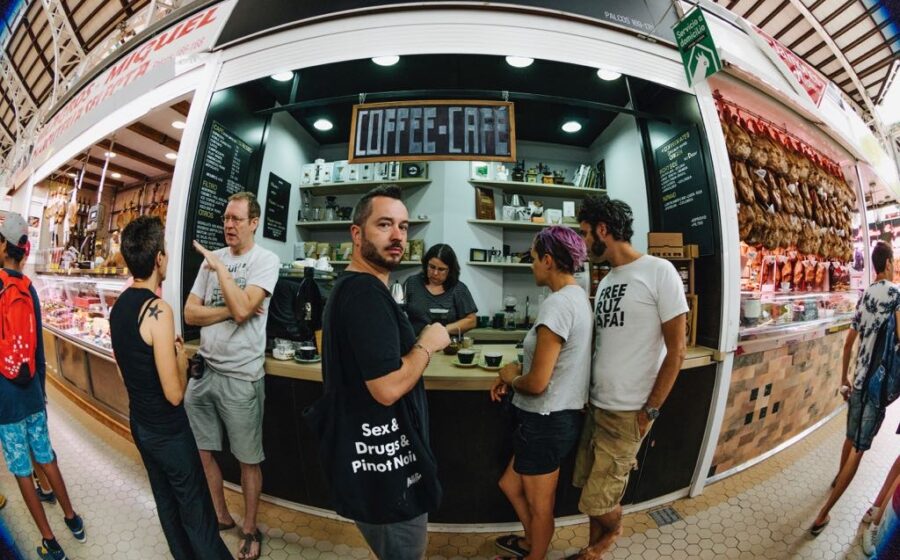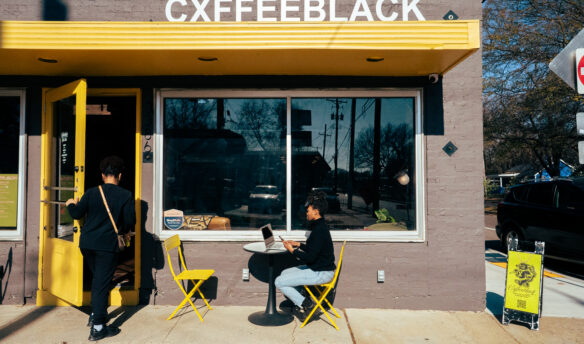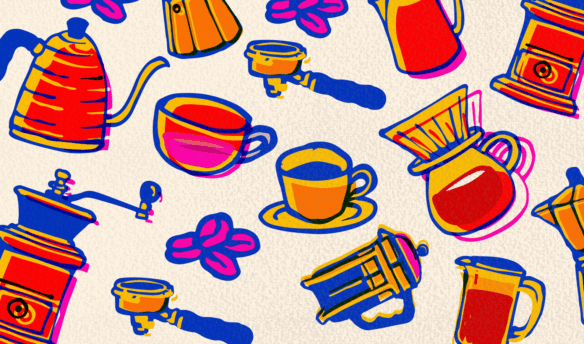Known for its Mediterranean light, modernist architecture, and culinary reputation, Valencia, a city on Spain’s eastern coast, is now attracting attention for something less expected: specialty coffee. What began as a handful of ambitious projects has recently coalesced into a grounded, dynamic coffee scene defined by hospitality, neighborhood culture, and an emerging local festival.
Across Spain, specialty coffee is no longer a niche—it’s a fast-growing sector. With an annual growth rate of 8.6%, the country’s specialty coffee industry as a whole is outpacing the broader commercial coffee market, and catching up to more established coffee scenes across Europe. This momentum is being driven by a new generation of consumers who value traceability, quality, and convenience. In response, business owners are building everything from walk-up kiosks and takeaway windows to cafes designed with a casual, community-first feel.
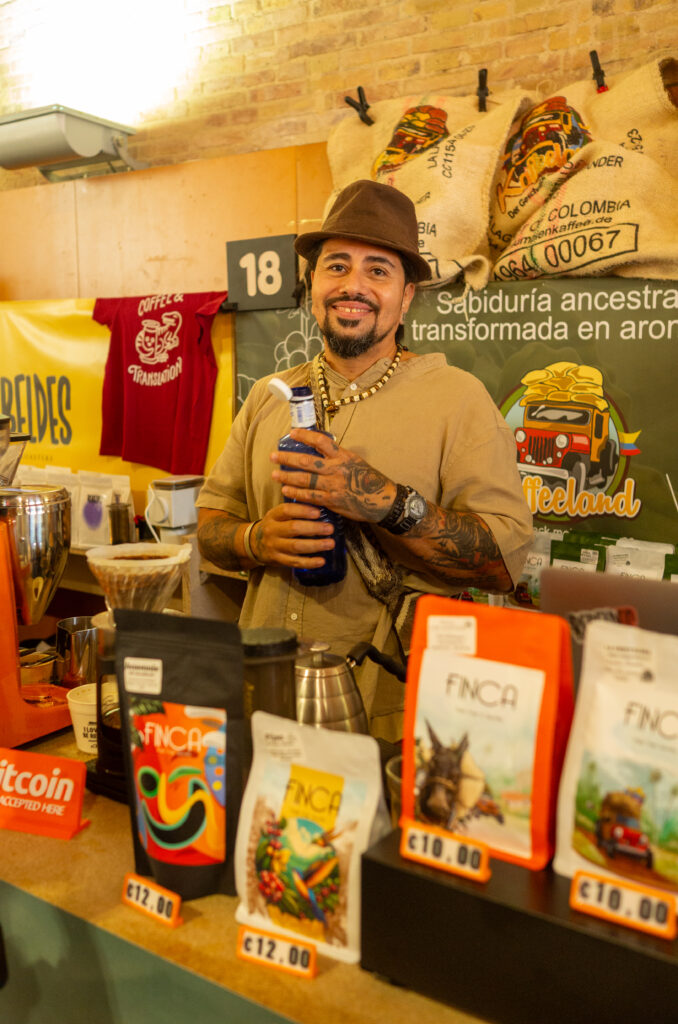
Amid this national rise, Valencia stands apart. Its cafes aren’t just increasing in number—they’re also offering something rare: a rooted connection to place that also encompasses a clear embrace of immigrant voices. Many beloved spots were founded by Valencia newcomers, whose traditions now shape the fabric of local hospitality.
As the city’s scene grows, cafes like Retrogusto Coffeemates and Fran Café—as well as other favorites including East Crema, News & Coffee, and Syra—are helping define what specialty coffee looks and feels like in Valencia today.
A Scene in Bloom
Specialty coffee has become almost as culturally significant to Valencians as vermouth (a staple of aperitivo hour—think happy hour in the U.S.) and Agua de Valencia, a local cocktail made with cava and citrus. All three drinks have their associated social rituals, and offer opportunities to pause and spend time with family or friends.
Valencia has just over 800,000 residents, and as of June 2025, the city has 90 specialty coffee shops, representing a 21% increase from the previous year. That means that, while Madrid and Barcelona still lead the way as Spanish coffee hubs, Valencia is quickly catching up.
When Martina Requena co-founded Retrogusto Coffeemates inside Valencia’s historic Mercado Central in 2013, she became one of the city’s leading voices in specialty coffee. Inspired by a single cup at Madrid’s Toma Café, she set out to bring that level of quality to her hometown. Her choice to open in a market known across Spain for its food heritage—and in the city where paella originated—wasn’t about creating a niche cafe, but about offering a high-quality product in a familiar setting.
Since then, Requena has worked nearly every role in and around the business—she’s been a barista, buyer, trainer, and consultant—and has shaped Retrogusto around values of respect, honesty, and connection in the process.
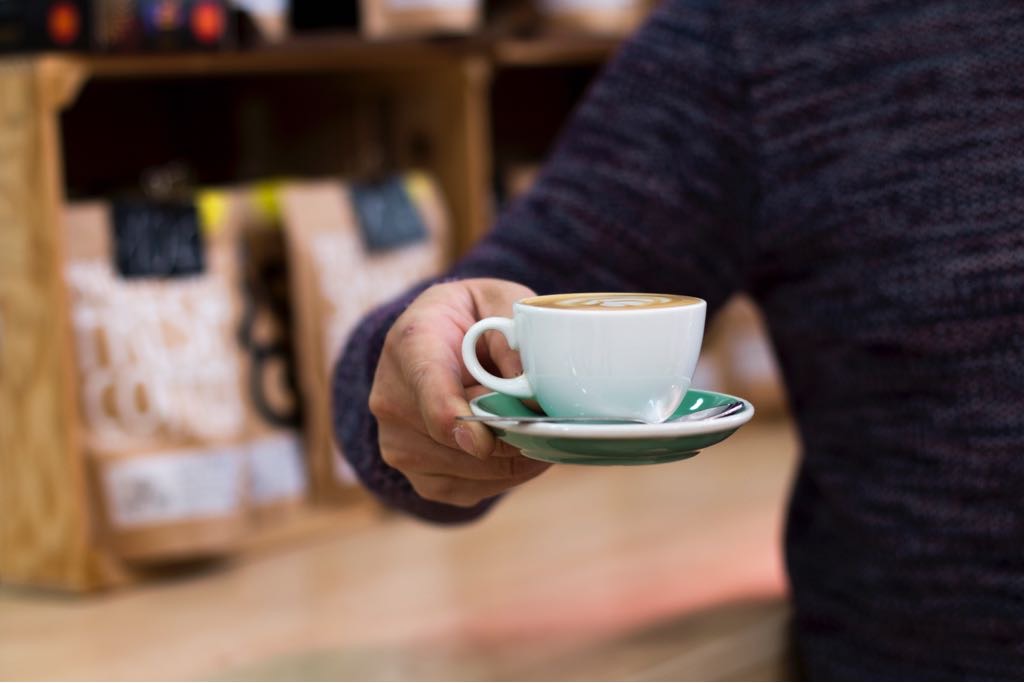
Today, Retrogusto’s customers range from seasoned consumers to casual market-goers. Some inquire about origin and process, while others simply want a good cup in a welcoming space. For Requena, both approaches are valid—and she sees establishing that balance between education and everyday enjoyment as a reflection of Valencia’s slower, Mediterranean rhythm.
“Specialty coffee here integrates naturally into a relaxed lifestyle by the sea, where people value both quality and experience,” she says. “There’s a very natural connection between good coffee, the sun, and unhurried conversations.”
Hospitality Without Borders
Victoria Grosso was born in Puerto Pirámides, a small town within a nature reserve in southern Argentina. There, her family ran a pub, and later a hotel with its own restaurant. She often helped out from a young age, which she says influenced her decision to pursue hospitality as a profession, and later inspired her to open Fran Café in Valencia’s Ruzufa neighborhood in 2022.
Grosso first came to Valencia by chance, accompanying her sister, who had enrolled in a master’s program. After the pandemic hit Argentina’s hospitality sector hard, she decided to stay in the city permanently, and open a cafe with her family. “I quickly realized the city offered a welcoming, community-driven alternative at a moment when hospitality back in Argentina was struggling,” Grosso says.
She envisioned Fran Café as a friendly, fast-service shop focused on takeaway coffee—something she felt Valencia was missing, and which would allow her to keep working with what she “loves and does best.” The goal was blending the warm, attentive style of Argentine hospitality with the Valencian way of life, and fostering a “neighborhood feel” in the process.
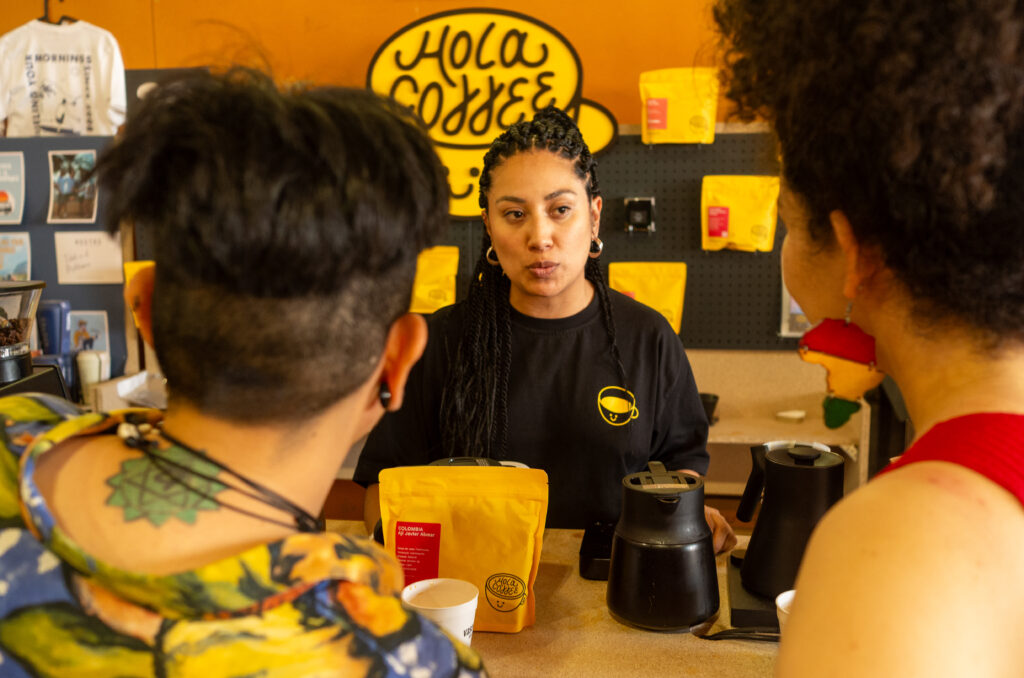
Grosso was quickly embraced by other coffee professionals in the city, who would visit Fran Café and wish her well. “Very soon after opening, I already knew everyone. That sense of being welcomed really stayed with me,” she says. During her first Christmas running the business, a 92-year-old regular named Carlos brought her a turrón, a traditional nougat sweet often served during the holiday. It was the first she had ever tried—and the moment she first felt like she belonged in her new city.
A year after opening Fran Café, Grosso and her family opened Casa Fran, a larger brunch space that also serves as a production kitchen.The two venues serve Argentine treats like alfajores (shortbread cookies filled with dulce de leche), which Grosso says both evoke her heritage and pair well with coffee. Even though the Valencian public wasn’t used to such morning sweets, “they embraced them,” she says.
For Grosso, what defines both venues is service, deeply shaped by what she learned in Argentina through her family’s businesses. “It’s vital to break down the wall of formality between customer and staff—while always maintaining professionalism,” she explains. “I remind my team that something can go wrong, but if we’re kind, customers will forgive almost anything. Our regulars have become like family.”
More broadly, Grosso hopes local businesses in Valencia will continue to support one another, calling hospitality “a brave and essential act of service to the community.” She also dreams of helping cultivate a true bakery culture—“una panadería” that serves everyone.
A Sister Act
Grosso is part of a wave of immigrants-turned-local-hospitality-entrepreneurs who have come to Valencia in recent decades. Sisters Miranda and Verónica Ciarfuglia also moved from abroad, and have made the city their home.
Born in Italy to an Italian father and a Mexican mother, the sisters grew up between Italy, London, and Mexico. Their father, who worked as a green coffee trader and machinery specialist, later settled in Valencia, and Miranda joined him there in 2016 to co-found Delicoffee Trade. Verónica followed in 2019.
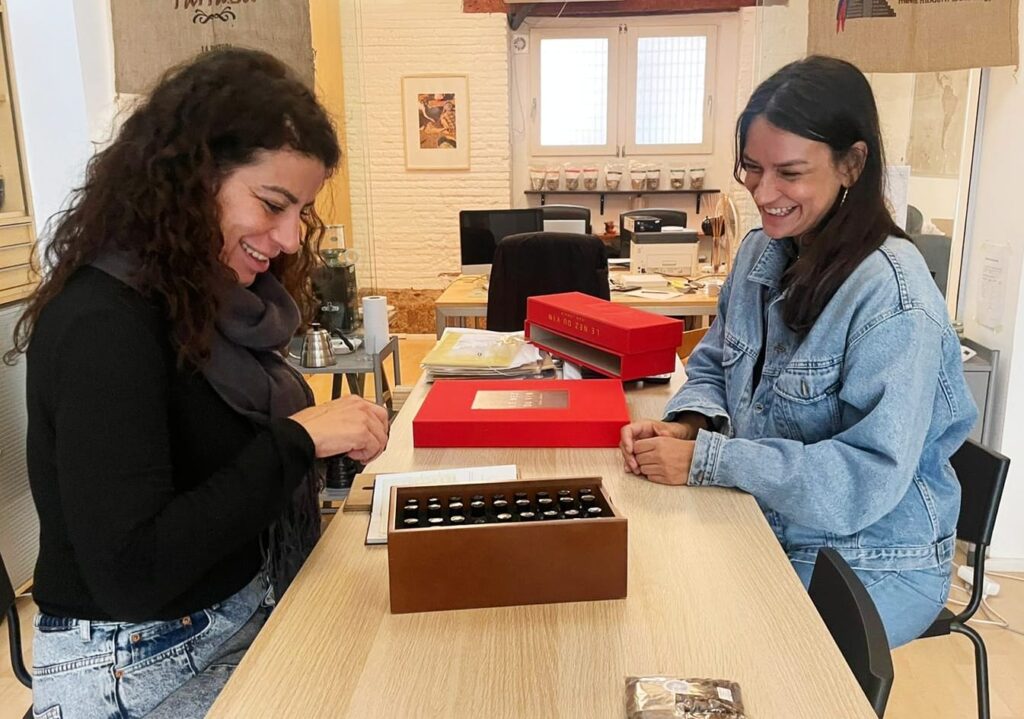
Together, the sisters learned the practical side of the coffee business—tracking shipments, handling numbers, and supporting logistics. But they also saw a gap in the market: Most European traders only sold coffee in large volumes, leaving small roasters without options.That realization sparked the creation of Delilab—a distinct branch of the family businesses focused on small-batch specialty coffee. For the two, it was a way to build on their father’s commercial foundation while reimagining what green coffee buying could look like for a new generation of roasters.
“The greatest lesson was understanding the human value behind each cup,” Miranda says. “In commercial coffee, the focus is on numbers—prices, harvests, markets—but rarely on the people who make it possible.”
The Ciarfuglia sisters describe Valencia’s specialty coffee scene as influenced by, but distinct from, bigger cities like Madrid or Barcelona. “Valencia has a very close-knit, open community,” Miranda says. “Everyone knows each other or makes newcomers feel welcome. It’s a city where it’s easy to feel part of something.”
They say the Delilab warehouse quickly became a hub for cuppings and trainings with international educators, turning into a meeting point for local coffee enthusiasts. Once COVID travel restrictions were lifted, the Ciarfuglia sisters started attending international coffee festivals in Europe. They later decided to start their own festival, a welcoming event that would be the voice of Valencia’s growing coffee community.
The first edition of the festival, which they called Valencia Is Coffee, took place in 2024 and was literally a pop-up—small, but dynamic. In 2025, the sisters moved to a larger venue at La Petxina Cultural Complex. Attendance doubled in just one year—from 750 to 1,500 visitors—showing that Valencia’s community was ready to delve deeper into coffee. “Since the first edition, people showed up, asked questions, brought their parents and friends,” says Miranda.
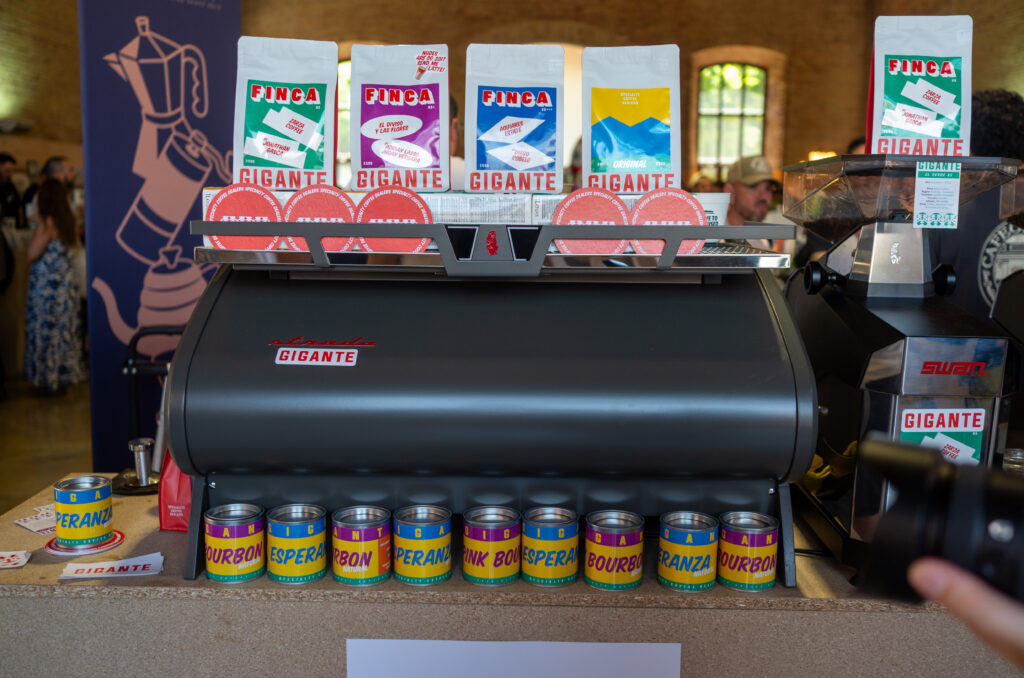
From the beginning, local cafes like Retrogusto and Fran supported the project. Requena and Grosso were both present at the 2024 and 2025 editions, offering tastings, joining panels, and cheering the scene’s momentum.“It felt like something the city had been waiting for,” says Requena. “We needed a space where coffee wasn’t just a product—it was people, conversations, curiosity.”
Spain’s specialty coffee landscape may still be catching up to longer-established European markets. But Valencia is carving out its own identity, shaped by a mix of longtime locals and newcomers who bring diverse influences with them. Many of the people behind the city’s cafes—immigrants, returnees, or first-time entrepreneurs—see coffee not just as a product, but as a way to build something more lasting: a thriving community.

